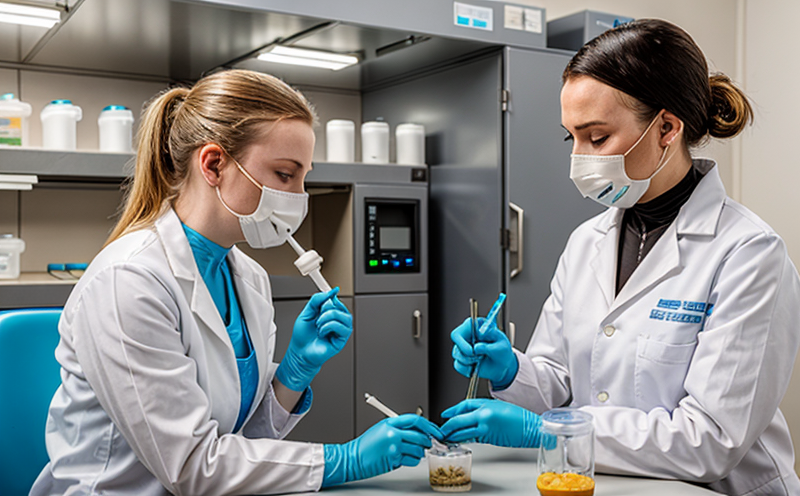EN 19204 Ergot Alkaloid Testing in Rye Products
The European standard EN 19204 outlines a procedure for determining ergot alkaloids in rye and its products. This method is crucial for ensuring food safety, particularly because ergot alkaloids can be toxic to humans and animals if consumed in significant quantities. Ergot poisoning (ergotism) has been historically linked to the consumption of contaminated grain, leading to severe health issues such as gangrene, convulsions, and hallucinations.
Our laboratory adheres strictly to EN 19204, providing accurate and reliable testing services for ergot alkaloids in rye products. Our team of experts ensures that all samples undergo thorough analysis using state-of-the-art instrumentation. The method involves extraction procedures followed by chromatographic separation and quantification.
The process begins with the collection of representative samples from various batches or lots, ensuring a comprehensive understanding of the ergot alkaloid content across different production stages. Samples are then prepared according to EN 19204 guidelines, which include homogenization and extraction using appropriate solvents. After extraction, the sample is subjected to purification steps to remove interfering compounds before final analysis.
The analytical method used in our laboratory employs high-performance liquid chromatography (HPLC) coupled with ultraviolet detection for quantification. This approach allows us to detect even trace amounts of ergot alkaloids present in rye and its products, ensuring compliance with international safety standards.
Our testing adheres strictly to EN 19204 requirements, which include the use of specific chromatographic columns, mobile phases, and detection wavelengths optimized for ergot alkaloid identification. The results are reported based on the limits specified in this standard, providing clear and actionable data for our clients.
Understanding the presence and levels of ergot alkaloids is vital not only from a safety perspective but also to maintain consumer trust and comply with regulatory requirements. Our laboratory plays a critical role in ensuring that food products derived from rye meet these stringent standards.
- Certified Compliance: All our tests are conducted under the strictest quality control measures, ensuring adherence to EN 19204 guidelines.
- Expertise and Experience: Our team of scientists has extensive experience in ergot alkaloid testing, providing reliable results every time.
- State-of-the-Art Equipment: Leveraging advanced chromatographic equipment allows us to deliver precise and accurate test results.
- Comprehensive Reporting: Detailed reports are provided, including raw data and interpretation, ensuring transparency for our clients.
In conclusion, our EN 19204 ergot alkaloid testing in rye products service is designed to meet the highest standards of accuracy and reliability. By partnering with us, you can ensure that your food production processes are compliant with international safety regulations.
Scope and Methodology
The scope of our EN 19204 ergot alkaloid testing in rye products service includes the analysis of various ergot alkaloids present in different rye products. This standard specifies the procedure for determining ergometrine, ergocornine, ergosine, and their derivatives, which are collectively known as ergot alkaloids.
The methodology involves several key steps: sample preparation, extraction, purification, and final analysis by HPLC with UV detection. The first step is to collect representative samples from the batch or lot being tested. These samples undergo homogenization followed by extraction using a solvent compatible with the standard. After extraction, the solution is filtered and concentrated before undergoing further purification steps.
The purified sample is then ready for injection into the HPLC system. Chromatographic separation allows for precise identification of ergot alkaloids based on their retention times and peak areas. Detection occurs via UV absorption at a wavelength suitable for each ergot alkaloid, providing quantitative data consistent with EN 19204.
The results are reported according to the specified limits in this standard, ensuring that all findings align with international safety guidelines. Compliance with these standards is crucial for maintaining food quality and safety across various sectors, including manufacturing, distribution, and retail.
Eurolab Advantages
Our laboratory stands out in the field of ergot alkaloid testing through several key advantages:
- Certified Compliance: Our tests are conducted under strict quality control measures, ensuring adherence to EN 19204 guidelines.
- Expertise and Experience: With a team of scientists specializing in ergot alkaloid testing, we provide reliable results every time.
- State-of-the-Art Equipment: Leveraging advanced chromatographic equipment allows us to deliver precise and accurate test results.
- Comprehensive Reporting: Detailed reports are provided, including raw data and interpretation, ensuring transparency for our clients.
We offer a range of additional services tailored to meet the specific needs of our clients in various sectors. Our dedicated team works closely with quality managers, compliance officers, R&D engineers, and procurement professionals to ensure that all testing requirements are met efficiently and effectively.
By choosing Eurolab for your ergot alkaloid testing needs, you can be confident in the accuracy and reliability of our results, contributing significantly to maintaining food safety standards across Europe.





